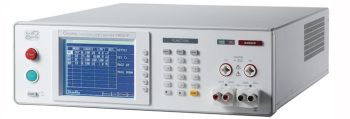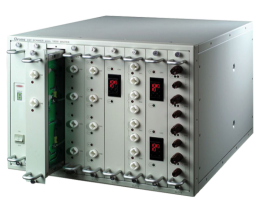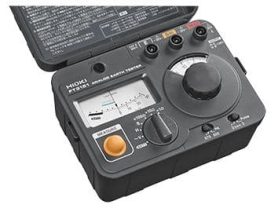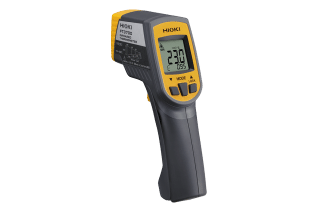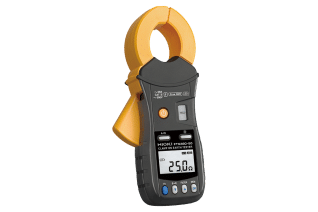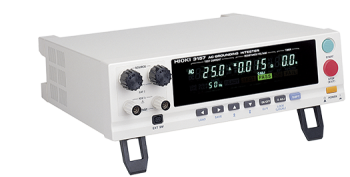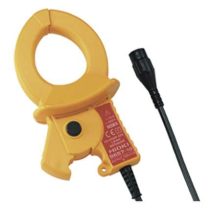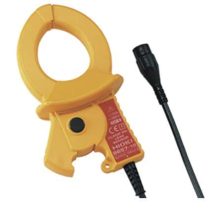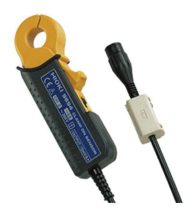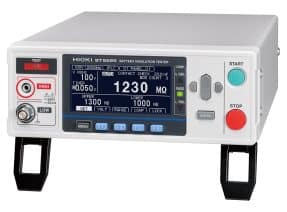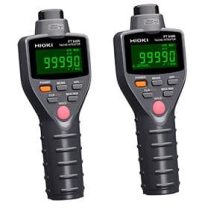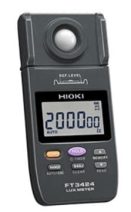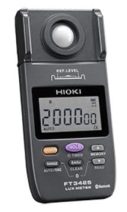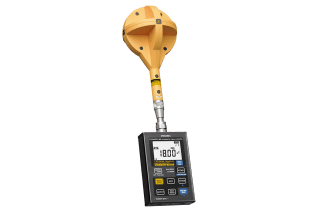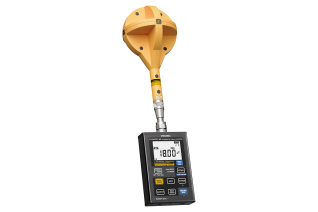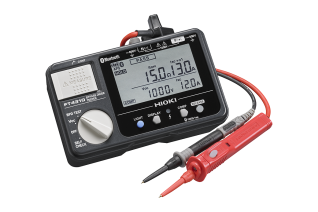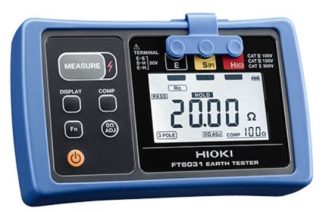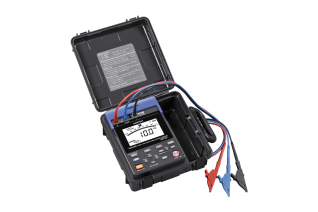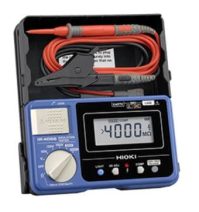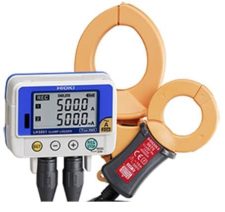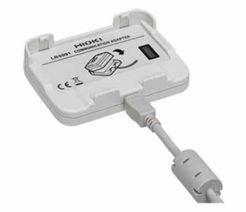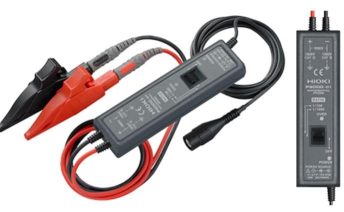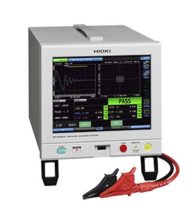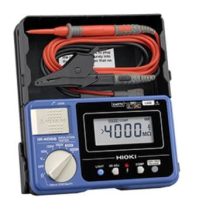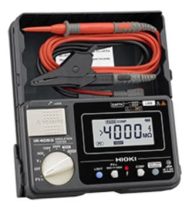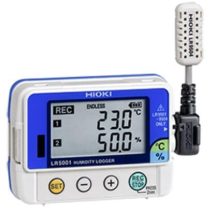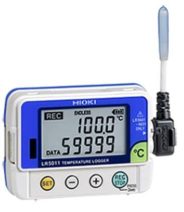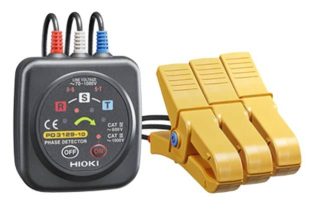Electrical Safety /
Ground Bond Testers
Ground bond testers are specialized electrical testing instruments used to verify the quality and safety of electrical ground connections in various applications, including manufacturing, production, and maintenance environments. These testers ensure that electrical equipment is properly grounded, preventing hazards to operators and damage to equipment. The purpose of a ground bond test is to measure the resistance of an electrical ground connection. The resistance should be low to safely conduct electrical current to the ground. A typical ground bond tester consists of a power supply, a current meter, and test leads with clamps or probes for attaching to the ground connection being tested. To perform a ground bond test, connect the test leads to the ground connection and apply a test current. The instrument measures the voltage drop across the connection and calculates the resistance using Ohm's law. If the measured resistance is within an acceptable range, the connection is considered safe and functional. Ground bond testers are critical tools for ensuring the safety and reliability of electrical equipment. They also help diagnose and troubleshoot electrical problems, ensure compliance with regulatory standards, and meet industry requirements. Different ground bond testers are available on the market, from handheld devices to advanced automated systems. Some testers can perform other electrical tests, such as insulation resistance and continuity tests. The selection of a ground bond tester depends on the specific needs, requirements, budget, and available resources for the application.
Ground bond testers are specialized electrical testing instruments used to verify the quality and safety of electrical ground connections in various applications, including manufacturing, production, and maintenance environments. These testers…
...ensure that electrical equipment is properly grounded, preventing hazards to operators and damage to equipment.
The purpose of a ground bond test is to measure the resistance of an electrical ground connection. The resistance should be low to safely conduct electrical current to the ground. A typical ground bond tester consists of a power supply, a current meter, and test leads with clamps or probes for attaching to the ground connection being tested.
To perform a ground bond test, connect the test leads to the ground connection and apply a test current. The instrument measures the voltage drop across the connection and calculates the resistance using Ohm’s law. If the measured resistance is within an acceptable range, the connection is considered safe and functional.
Ground bond testers are critical tools for ensuring the safety and reliability of electrical equipment. They also help diagnose and troubleshoot electrical problems, ensure compliance with regulatory standards, and meet industry requirements.
Different ground bond testers are available on the market, from handheld devices to advanced automated systems. Some testers can perform other electrical tests, such as insulation resistance and continuity tests. The selection of a ground bond tester depends on the specific needs, requirements, budget, and available resources for the application.
-
The Chroma 19572 ground bond tester is an instrument dedicated to measuring the grounding resistance within the range of 0.1-510mΩ. Its compact and...FIND OUT MORE
-
FUNCTIONS Supports electrical safety tests and function test scanning : – AC/DC WV Test, – IR Test – GB Test, LC Test (all...FIND OUT MORE
-
The latest safety standards for medical equipment are very strict and because the medical equipment is in constant use by medical staff for patient...FIND OUT MORE
-
The Chroma 19032 /19032-P is a 5 in 1 Production Safety Analyzer. It can perform AC/DC Hipot, insulation resistance, grounding resistance and dynamic...FIND OUT MORE
-
The Chroma 19200 can perform high / low voltage switch and scan all safety tests by EST Analyser (Chroma 19032) inputs such as withstanding test;...FIND OUT MORE
-
Earthing or grounding of electrical equipment is essential to maintain safety, protecting lives, as well as prevent damage to equipment. The FT3151...FIND OUT MORE
-
The FT3700 and FT3701 are non-contact thermometers using infrared rays, accurately pinpointing the spot with a two-beam laser marker. The infrared...FIND OUT MORE
-
The FT6380 measures grounding resistance simply by clamping to multiple-grounded ground wires. No auxiliary grounding rod is needed, and there is no...FIND OUT MORE
-
The Hioki 3157 AC Grounding HiTester is an AC ground bond tester designed for protection circuit testing of a wide range of electrical equipment....FIND OUT MORE
-
Hioki current sensors are best-in-class devices for accurately capturing a wide range of current levels. The Hioki 9657-10 is a voltage output clamp...FIND OUT MORE
-
Hioki current sensors are best-in-class devices for accurately capturing a wide range of current levels. The Hioki 9657-10 is a voltage output clamp...FIND OUT MORE
-
Hioki current sensors are best-in-class devices for use with power meters and PQAs. The Hioki 9694 is a 5A AC clamp sensor with voltage output for...FIND OUT MORE
-
Detect contamination that could cause defects. Improve battery cell productivity through high-speed testing. The detection testing function monitors...FIND OUT MORE
-
Discontinued! The Hioki FT3405 and FT3406 are portable, contactless digital tachometers that use reflected visible spectrum light to measure the...FIND OUT MORE
-
The Hioki FT3424 is a light meter designed for an extensive range of applications involving illumination equipment, lighting work and facility...FIND OUT MORE
-
The Hioki FT3425 is a light meter designed for an extensive range of applications involving illumination equipment, lighting work and facility...FIND OUT MORE
-
The Hioki FT3432 sound level meter is used in noise management by facilitating the measurement of noise in factories and schools, near machinery,...FIND OUT MORE
-
Introducing the Hioki MAGNETIC FIELD HiTESTER FT3470-51, the ultimate tool for measuring magnetic flux density and magnetic field exposure in 3 axes....FIND OUT MORE
-
Introducing the MAGNETIC FIELD HiTESTER FT3470-52, a top-of-the-line magnetic field meter designed to provide accurate and reliable measurements for...FIND OUT MORE
-
Traditionally, bypass diodes can only be inspected for good working condition at night or when power is not being generated by the solar panels in...FIND OUT MORE
-
Earthing or grounding of electrical equipment is essential to maintain safety, protecting lives, as well as prevent damage to equipment. The...FIND OUT MORE
-
Introducing the Hioki IR3455 insulation resistance tester – the all-in-one solution for measuring the insulation of high-voltage equipment such...FIND OUT MORE
-
Hioki insulation testers or megohmmeters feature all-in-one designs including built-in rugged cases and test lead storage compartments. The Hioki...FIND OUT MORE
-
Hioki compact 1 or 2-channel data loggers feature a 60,000 data set/channel memory to measure temperature, humidity, voltage or instrumentation...FIND OUT MORE
-
The Hioki LR5091 is a communication adapter for transferring data from the Hioki LR5000 Series Data Loggers. Simply dock the data logger onto the...FIND OUT MORE
-
The P9000 Differential Probe by Hioki is a high-quality measuring instrument designed for high voltage testing in CAT III 1000 V environments. Its...FIND OUT MORE
-
The Hioki ST4030A is an impulse winding tester, or surge tester, that combines the functions of both a resistance meter and insulation-withstand...FIND OUT MORE
-
Hioki insulation resistance testers or megohmmeters feature all-in-one designs including built-in rugged cases and test lead storage compartments....FIND OUT MORE
-
The Hioki IR4053 is a digital insulation resistance tester for photovoltaic generation systems. Measure insulation resistance accurate and safely...FIND OUT MORE
-
Hioki compact 1 or 2-channel data loggers feature a 60,000 data set/channel memory to measure temperature, humidity, voltage or instrumentation...FIND OUT MORE
-
Hioki compact 1 or 2-channel data loggers feature a 60,000 data set/channel memory to measure temperature, humidity, voltage or instrumentation...FIND OUT MORE
-
Hioki’s non-contact voltage detection and measurement technology places efficiency and safety as priority considerations with the goal of...FIND OUT MORE




